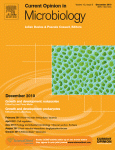Mitochondrial inheritance in fungi. [Curr Opin Microbiol. 2010 Dec;13(6):712-9. Epub 2010 Sep 29.]
Christoph W. Basse
Abstract
Faithful inheritance of mitochondria is essential for growth and development. Uniparental inheritance of mitochondria is a common phenomenon in sexual eukaryotes and has been reported for numerous fungal species. Uniparental inheritance is a genetically regulated process, aimed to gain a homoplasmic state within cells, and this is often associated with selective elimination of one parental mitochondria population. This review will focus on recent developments in our understanding of common and specified regulatory circuits of selective mitochondrial inheritance during sexual development. It further refers to the influence of mitochondrial fusion on generation of recombinant mitochondrial DNA molecules. The latter aspect appears rather exciting in the context of intron homing and could bring a new twist to the debate on the significance of uniparental inheritance. The emergence of genome-wide studies offers new perspectives to address potential relationships between uniparental inheritance, vegetative inheritance and last but not least cellular scavenging systems to dispose of disintegrated organelles.


